Related Research Articles
In politics, a red–green alliance or red–green coalition is an alliance of "red" parties with "green" parties. The alliance is often based on common left political views, especially a shared distrust of corporate or capitalist institutions. While the "red" social-democratic parties tend to focus on the effects of capitalism on the working class, the "green" environmentalist parties tend to focus on the environmental effects of capitalism.
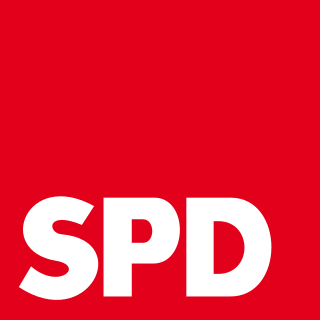
The Social Democratic Party of Germany is a social democratic political party in Germany. It is one of the two major contemporary political parties in Germany along with the Christian Democratic Union of Germany (CDU).
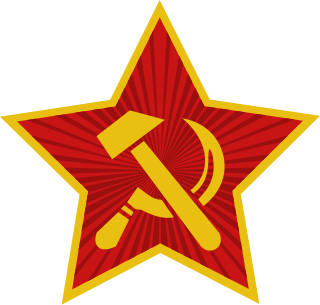
The Communist Party of Germany was a major political party in the Weimar Republic between 1918 and 1933, an underground resistance movement in Nazi Germany, and a minor party in West Germany in the postwar period until it was banned in 1956.

Herbert Richard Wehner was a German politician. A former member of the Communist Party, he joined the Social Democrats (SPD) after World War II. He served as Federal Minister of Intra-German Relations from 1966 to 1969 and thereafter as chairman of the SPD parliamentary group in the Bundestag until 1983.

The German Revolution or November Revolution was a civil conflict in the German Empire at the end of the First World War that resulted in the replacement of the German federal constitutional monarchy with a democratic parliamentary republic that later became known as the Weimar Republic. The revolutionary period lasted from November 1918 until the adoption of the Weimar Constitution in August 1919.

Friedrich "Fritz" Ebert Jr. was a German politician and East German communist official, the son of Germany's first president Friedrich Ebert.
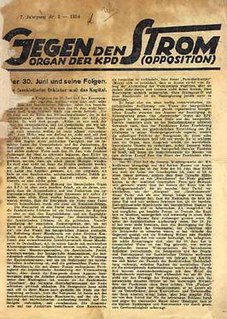
The Communist Party of Germany (Opposition), generally abbreviated as KPO or KPD(O), was a communist opposition organisation established at the end of 1928 and maintaining its existence until 1939 or 1940. After the rise of Adolf Hitler and the Nazi Party to power in January 1933, the KPO existed only as an illegal and underground organization. The group initially sought to modify, later to replace, the mainstream Communist Party of Germany (KPD) headed by Ernst Thälmann. The KPO was the first national section affiliated to the International Communist Opposition (ICO).

Udo Bullmann is a German politician who has been serving as a member of the European Parliament since 1999. He is a member of the Social Democratic Party of Germany (SPD), part of the Party of European Socialists.

The Communist Party of Denmark is a communist political party in Denmark. DKP was founded on 9 November 1919 as the Left-Socialist Party of Denmark through a merger of the Socialist Youth League and Socialist Labour Party of Denmark, both of which had broken away from the Social Democrats in March 1918. The party assumed its present name in November 1920, when it joined the Comintern.

The Social Democracy of the Kingdom of Poland and Lithuania, originally the Social Democracy of the Kingdom of Poland (SDKP), was a Marxist political party founded in 1893 and later served as an autonomous section of the Russian Social Democratic Labour Party. It later merged into the Communist Workers Party of Poland. Its most famous member was Rosa Luxemburg.
The Social Democratic Party of Saarland was a political party existing between 1946 and 1956 in the Saar Protectorate. It had a short-lived predecessor, the Social Democratic Regional Party of the Saar Territory existing between 1933 and 1935 in the Saar Territory.
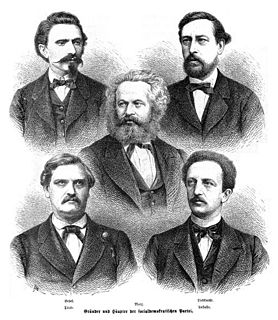
The foundation of the Social Democratic Party of Germany can be traced back to the 1860s, and for much of the 20th and 21st centuries it has represented the centre-left in German politics. Nevertheless from 1891 to 1959 the Party at least theoretically espoused Marxism.
The Old Social Democratic Party of Germany, known as the Old Social Democratic Party of Saxony until 1927, was a political party in Germany. The party was a splinter group of the Social Democratic Party of Germany (SPD) in Saxony, and had nationalistic tendencies. Whilst the party failed to become a mass party, it played a significant role in state politics in Saxony during the latter half of the 1920s. A leader of the party, Max Heldt, served as Minister-President of Saxony 1926-1929. Wilhelm Buck was the chairman of the party.

Arthur Crispien was a German Social Democratic politician.

Bernd Lange is a German politician and member of the European Parliament from Germany. He is a member of the Social Democratic Party, part of the Party of European Socialists.
The Union of German Socialist Organisations in Great Britain was the amalgamation of German socialist and social democratic oriented organisations of exiled Germans during World War II.
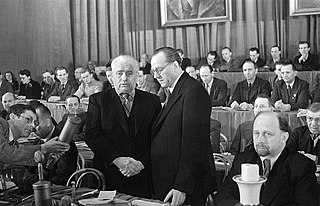
The Communist Party of Germany (KPD) and the Social Democratic Party of Germany (SPD) merged to form the Socialist Unity Party of Germany (SED) on 21 April 1946 in the territory of the Soviet occupation zone. It is considered a forced merger. In the course of the merger, about 5,000 Social Democrats who opposed it were detained and sent to camps and jails.
The Labour and Socialist International was an international organization of socialist and labour parties, active between 1923 and 1940. The group was established through a merger of the rival Vienna International and the former Second International, based in London, and was the forerunner of the present-day Socialist International.
Kurt Rosenfeld was a German lawyer and politician (SPD). He was a member of the national parliament ("Reichstag") between 1920 and 1932.

The People's State of Bavaria was a short-lived socialist state in Bavaria from 1918 to 1919. The People's State of Bavaria was established on 8 November 1918 during the German Revolution, as an attempt at a socialist state to replace the Kingdom of Bavaria. The state was led by Kurt Eisner until his assassination in February 1919, and co-existed with the rival Bavarian Soviet Republic from 6 April 1919, with its government under Johannes Hoffmann exiled in Bamberg. The People's State of Bavaria was dissolved upon the establishment of the Free State of Bavaria on 14 August 1919.
References
- ↑ Quack, Sibylle (7 November 2002). Between Sorrow and Strength: Women Refugees of the Nazi Period. Cambridge University Press. ISBN 978-0-521-52285-4 . Retrieved 22 June 2020.